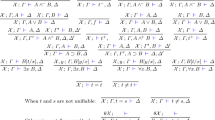Abstract
We present a compositional method for deciding whether a process satisfies an assertion. Assertions are formulas in a modal ν-calculus, and processes are drawn from a very general process algebra inspired by CCS and CSP. Well-known operators from CCS, CSP, and other process algebras appear as derived operators. The method iscompositional in the structure of processes and works purely on the syntax of processes. It consists of applying a sequence ofreductions, each of which only takes into account the top-level operator of the process. A reduction transforms a satisfaction problem for a composite process into equivalent satisfaction problems for the immediate subcomponents. Using process variables, systems with underfined subcomponents can be defined, and given an overall requirement to the system,necessary and sufficient conditions on these subcomponents can be found. Hence the process variables make it possible to specify and reason about what are often referred to ascontexts, environments, andpartial implementations. Since reductions are algorithms that work on syntax, they can be considered as forming a bridge between traditional noncompositional model checking and compositional proof systems.
Similar content being viewed by others
References
ColinStirling. Modal and temporal logics. InHandbook of Logic in Computer Science, S.Abramsky, D.Gabbay, and T.Maibaum, (eds.). Oxford University Press, Oxford, 1991.
Mads Dam. Translating CTL* into the modal μ-calculus. Technical Report ECS-LFCS-90-123, Laboratory for Foundations of Computer Science, University of Edinburgh, November 1990.
E. Allen Emerson and Chin-Luang Lei. Efficient model checking in fragments of the propositional mu-calculus. InSymposium on Logic in Computer Science, Proceedings. IEEE, 1986, pp. 267–278.
E.M.Clarke, E.A.Emerson, and A.P.Sistla. Automatic verification of finite-state concurrent systems using temporal logic specifications.ACM Transactions on Programming Languages and Systems, 8(2): 244–263, 1986.
Colin Stirling and David Walker. Local model checking in the modal mu-calculus. InProceedings of TAPSOFT, Barcelona, Spain, March 1989, LNCS 351: 369–393, 1989.
Kim G. Larsen. Proof systems for Hennessy-Milner logic with recursion. InProceedings of CAAP, 1988.
Glynn Winskel. A note on model checking the modal ν-calculus. In Ausiello, Dezani-Ciancaglini, and Rocca (eds.).Proceedings of ICALP, Ausiello,Lecture Notes in Computer Science, 372: 761–772, 1989.
RanceCleaveland. Tableau-based model checking in the propositional mu-calculus.Acta Informatica, 27: 725–747, 1990.
AndréArnold and PaulCrubille. A linear algorithm to solve fixed-point equations on transitions systems.Information Processing Letters, 29: 57–66, 1988.
E.M. Clarke, D.E. Long, and K.L. McMillan. Compositional model checking. InProceedings of 4th Annual Symposium on Logic in Computer Science, Pacific Grove, CA. IEEE, 353–362, 1989.
Kim G. Larsen and Liu Xinxin. Compositionality through an operational semantics of contexts. InProceedings of ICALP, M.S. Paterson (ed.).Lecture Notes in Computer Science, 443, 526–539, 1990.
A.Tarski. A lattice-theoretical fixpoint theorem and its applications.Pacific Journal of Mathematics, 5: 285–309, 1955.
H.Bekić. Definable operations in general algebras, and the theory of automata and flow charts.Lecture Notes in Computer Science, 177: 30–55, 1984.
Glynn Winskel. On the compositional checking of validity. InProceedings of CONCUR '90, J.C.M. Baeten and J.W. Klop (eds.).Lecture Notes in Computer Science, 485: 481–501, 1990.
P.Aczel. An introduction to inductive definitions. InHandbook of Mathematical Logic, JonBarwise (ed.). North-Holland, Amsterdam, 1983.
Author information
Authors and Affiliations
Rights and permissions
About this article
Cite this article
Andersen, H.R., Winskel, G. Compositional checking of satisfaction. Form Method Syst Des 1, 323–354 (1992). https://doi.org/10.1007/BF00709155
Issue Date:
DOI: https://doi.org/10.1007/BF00709155




